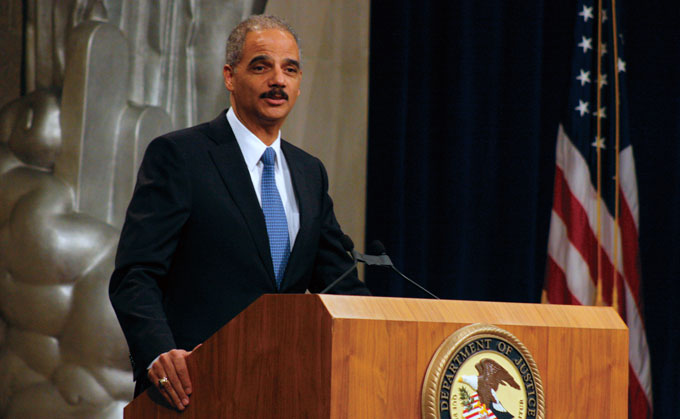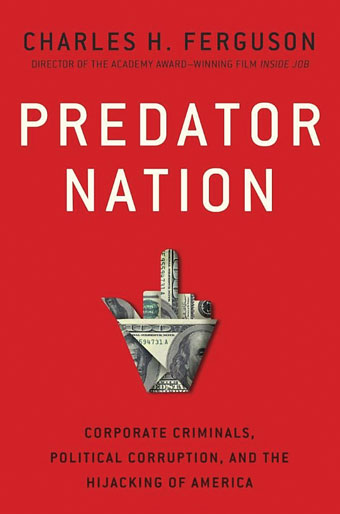Unprosecuted Crimes
by Bruce Fisher


Charles Ferguson indicts the bankers Eric Holder should
Many still hold out hope that in his second term, President Barack Obama’s administration will move against the criminals who caused the international financial crisis of 2008 and the worldwide recession that lasted until 2011. Charles Ferguson, the Oscar-winning filmmaker who brilliantly exposed and explained their wrongdoing in his 2010 documentary film, Inside Job, writes in his new book, Predator Nation, that he doesn’t think Obama will do any such thing.
Ferguson names the names of Obama’s senior staff: There are many who have walked through the Wall Street-Washington revolving door. Attorney General Eric Holder and his deputy Lanny Breuer, who runs the criminal division, were partners at powerhouse Washington law firm Covington & Burling, whose clients were Bank of America, Citigroup, JPMorgan Chase, and Freddie Mac. Ferguson writes that had it not been for pressure from the Occupy Wall Street movement and from a two-part 60 Minutes series in 2011 on how none of these firms or their principals were being prosecuted, it might have been easier for our temporary public servants to avoid even a token gesture of a federal investigation.
Now, in 2012, we see New York State Attorney General Eric Schneiderman going at it like a latter-day Eliot Spitzer, but we also see that the co-chair of his task force on financial crime is none other than the aforementioned Lanny Breuer, “the same head of the same criminal division [of the US Department of Justice] that hadn’t brought any cases for four years.” Breuer personally used to represent the Moody’s bond-rating agency, which was exposed after 2008 for its Triple-A ratings of junk mortgage-backed derivatives that stank, sank, and tanked the global economy. The revolving door spins quickly: Both Holder and Breuer have seen their most senior staffers return to Covington & Burling to resume their work for the persons and firms that citizens still vainly hope our government will prosecute.
Righteous anger at the unchallenged political power of the financial industry briefly united the Tea Party and the Occupy protesters in spirit and even in principle. But then the Tea Party became the Bain Capital/Kill Medicare party that nominated Mitt Romney and Paul Ryan, and the Occupy movement entered the dustbin of history. The listlessness or fatigue that some discerned in Obama’s speech at the Democratic Convention may have been his response to the consultants who tell him not to go too hard on investment bankers, the hedge funds, the wealth advisors, and the big banks because they are still capable of flooding Romney’s inbox with all the money he could possibly need to win the six swing states should Obama threaten them with anything more than a vaguely defined “millionaire’s tax.”
Obama came to adulthood working with ex-steelworkers Frank Lumpkin and Bob Davis, whose hands had become gnarled and whose bronchi had become scarred while working at Wisconsin Steel and at the South Works of US Steel down on 95th Street in Chicago. Frank and Bob and thousands of others lost their jobs when management mismanaged, refused to reinvest, sold to out-of-town firms that had no experience in steel but that knew how to maximize shareholder value by shedding workers, selling off equipment, outsourcing, and moving on. Obama knows how this works. And now, in the grip of the financial services industry just as surely as the Republican Party is in the grip of the financial services industry, with no deckhands on the ship of state but those with dirty hands, he’s like the rest of us: struggling to stay motivated.
Reading Ferguson’s new book is a difficult task because at the moment there is no happy ending. “America has experienced a profound realignment of its politics over the last generation,” he writes, explaining that we live in a two-party fiction he calls a duopoly. This is what he means: Both parties are colluding and under the influence of a single oligarchy.
The social and “values” conflicts between Republicans and Democrats are all dress up distractions. Reproductive rights? Global warming? Gun control? Creationism? Go ahead, rant away! Ring those doorbells! Fight with your kids at Sunday dinner! We are deluding ourselves into believing that there is a distinction, he says, because there is now “little difference on where the parties stand toward regulation of Wall Street” and any of the other concentrated and powerful industries that enrich Washington staffers as soon as they circulate back onto the street.
Ferguson’s prescription for curing this awful mess is a disappointing recitation of the same list that people who read this newspaper already know will never happen: campaign finance reform, re-regulation of Wall Street, tax reform, reinvigorated antitrust enforcement, plus Ferguson’s personal favorites, education reform and “truly universally accessible, high-speed broadband internet infrastructure” like everybody else in the world has.
Ferguson is a serious, accomplished person who is very much worth listening to. He is not wrong about a single damned thing. But let’s understand that the educated people who will buy his book already know the story pretty well. The corruption of the entire American political establishment by the big new money has given this country a Third World demeanor, with a tiny elite that is surpassingly rich while the masses are collapsing. Charles Ferguson—like Kevin Phillips, like Emmanuel Saez, like so many others who have reviewed the numbers—says that it’s not just that the top 10 percent of households have almost half the wealth, or that half of all the new money in the current post-2008 recovery has gone to just 15,000 households. It’s that there’s a growing underclass, a fading middle class, a loss of both income and of wealth among the bottom 90 percent of Americans, and now something else: a growing inequality of opportunity.
Silence, narcissism, and then what?
There is, notwithstanding all these well-grounded concerns about maldistribution of wealth, a self-aware new meritocracy of the entrepreneurial class, typically under 40, typically fluent in things technical. The have a certain impatience with democracy. They have no economic self-awareness except to the extent that they are burdened by student loans. Newly minted physicians, attorneys, MBAs, marketeers, and such are all about consumer choices, which tend toward the luxurious, and social choices, which tend toward the libertarian.
Reports in the business press and in the academic business journals don’t divulge proprietary data, but the reports are consistent: These consumers think in terms of brands, not ideology. They rank-order their consumption preferences in a manner that should delight Republicans, if only Republicans were able to divorce themselves from their under-schooled, race-resentful, elite-fearing, nominally Christian base, because these folks are all about self-reliance in a way that makes communitarian impulses seem as vibrant as insects jailed in amber—except when it comes to climate change and sexual identity. Marketeers are worried now that young, debt-burdened consumers would rather live in cities without ever buying a car, or a house, or any consumer items except electronics and heavily discounted major-brand knockoffs, and prefer to do their purchasing not in big-box stores, outlets, or neighborhood strips, but online. These are the new elite proletarians, and they voted for Obama in 2008. If they vote for him again in 2012, it will be because of consumer attitudes, positioning, and style, not because of economic self-awareness, but it will be despite their disappointment that he didn’t exercise dictatorial power to fix absolutely everything, in the way that kids want absolutely everything and they want it now. They seem to have no awareness of the crushing obstructionism of the Republican Congress, and would prefer that the president just fix it. All of it. Now. Like an app or a Google search or a next-day delivery from Amazon.com.
Should the probable happen, which means an Obama victory and a Republican House victory, too, then the world Ferguson describes in this book, like the world in his movie, won’t change. Everybody but the super-elite will slide. Everybody will get more and more impatient that things aren’t happening. Everybody clever will want to go to Columbia Business School or Harvard Business School, where the corrupted economists teach the cleverest all about the free market.
It’s because Americans should become much more aware of what our volunteer, meritocratic, largely Southern military women and men are thinking that the next book on our reading list will be Robert Kaplan’s newest, published September 11, 2012, The Revenge of Geography: What the Map Tells Us About Coming Conflicts and the Battle Against Fate. Military people have already told Kaplan what they told Edward Luce for his Time to Start Thinking: America in the Age of Descent, reviewed here recently: Our defense budget is too damned big, our broadband capacity is too damned small, Wall Street has to be reined in, our infrastructure needs to get fixed, we have to stop sending our troops to absurd places, and the politicians need to stop taking orders from criminals just because the criminals pay so well. Ferguson’s list of to-dos bears a striking resemblance to the message from the anonymous soldiers who talk to Kaplan. They know, as do we, that Ferguson is correct about the overwhelming power of Wall Street and corporate money. Neither the Tea Party nor the Occupy movements have any real interest in democracy, nor do the consumption-obsessed millennials.
If the political duopoly that Ferguson so depressingly portrays delivers more and more stress for more and more Americans, don’t count on the resentment going away. Maybe we should expect that it might get channeled in a whole new way.
Bruce Fisher is director of the the Center for Economic and Policy Studies at Buffalo State College. His new book is Borderland: Essays from the US-Canada Divide, available at bookstores or at www.sunypress.edu.
blog comments powered by Disqus|
Issue Navigation> Issue Index > v11n37 (Week of Thursday, September 13) > Unprosecuted Crimes This Week's Issue • Artvoice Daily • Artvoice TV • Events Calendar • Classifieds |









 Current Issue
Current Issue